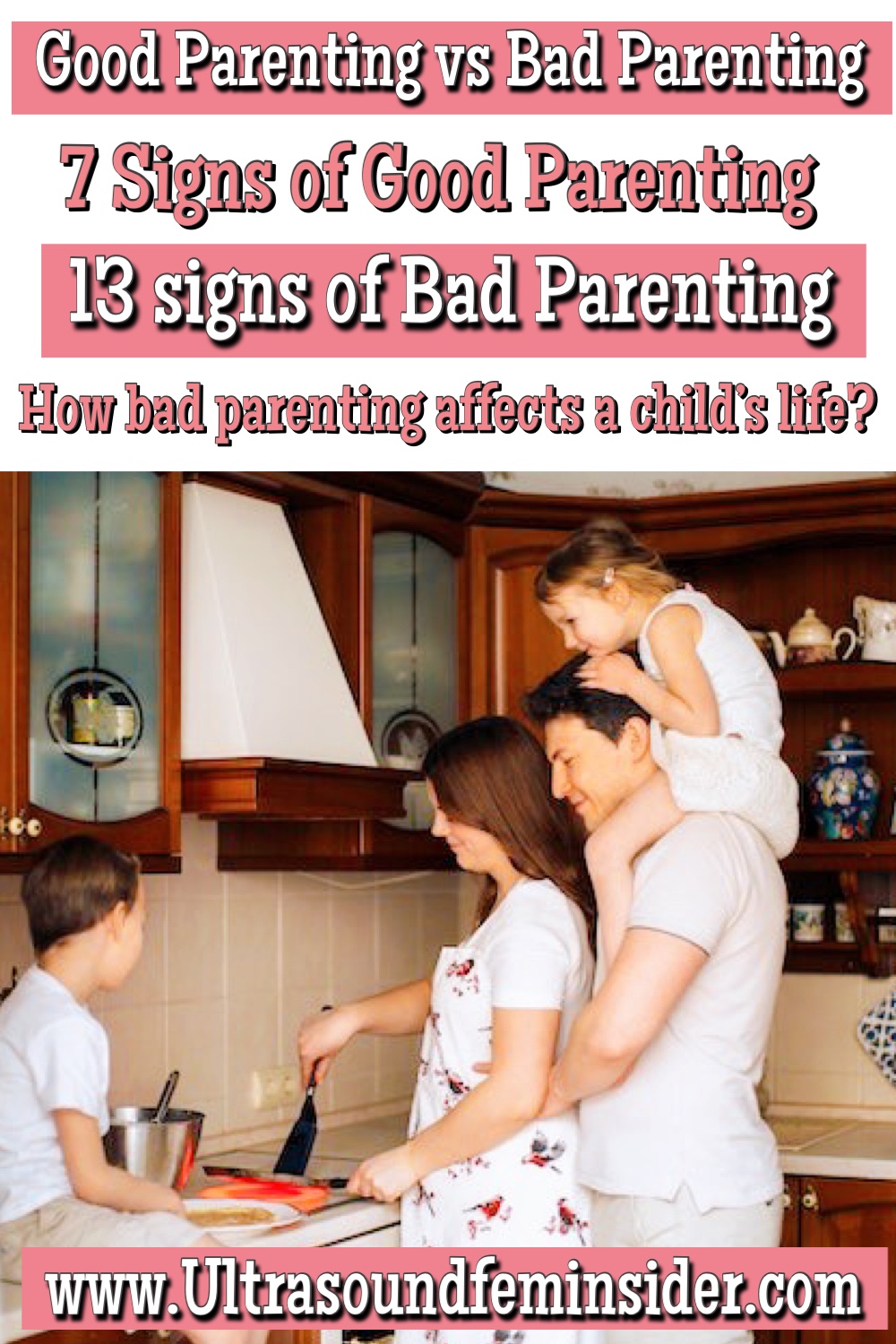You as a parent want nothing but the best for your children. However, this inclination may cause you to engage in parenting practices that are detrimental to your child’s growth and development. Even if it was unintentional, once you have said or done something that leaves someone wounded and damaged, it cannot be undone. Most people consider “Bad parenting” to be a fiction because they believe that no parent would intentionally harm their children. However, harsh words, hard regulations, and harsh punishments can have a lasting negative impact on children. So, in this article, we discuss the topic in detail with examples from every day life of all the Signs of Good Parenting vs Bad Parenting. And What you should know. Ready? Let’s begin.
Signs of Good Parenting vs Bad Parenting. Here is What you should know.
First, let’s take a look at what Good Parenting looks like.
1. Have hands-on involvement in parenting.
Let me start my good Parenting Tips by saying that you are not only the child’s parent and protector, but also someone who imparts vital life lessons that will stays with them forever. Therefore, try to establish an emotional bond that extends beyond the superficial trivialities of life, beyond the early years and beyond the test of time. Focus on a relationship that has control, but not at the expense of affection.
2. Avoid screaming or striking your child mainly in front of others.
Children can be challenging due of their propensity for misbehavior. It is likely that you will lose your temper and yell, leaving a child crying and upset. Some parents have no qualms about spanking their child in front of family members or even strangers. Thus, you are bad parents. You may regret it afterwards, but the damage has already been done.
Learn to control the child’s mischievous outbursts with moderation. For instance, if he destroys a sibling’s toy, take away his favorite item and condition its return on an apology and a pledge to never do it again. Once he does so, you must explain why his acts were wrong and how he must never damage the property of another person.
3. Provide explanations for your instructions.
Children sometimes does not comprehend the reason behind an order such as “Sleep on time at night” As a parent, it is your responsibility to explain the reasons in a way that the child can comprehend. Do not use phrases such as “Because I say so!” or “Stop asking questions and go to bed!” This sets a bad example. Kids have a natural desire to resist things they do not comprehend.
If you establish new regulations, discuss them with the child prior to their implementation. Thus, he is included in the procedures and is informed of what he is not permitted to do. Discussions with the child increase his self-esteem and make him feel valued. He will also take responsibility for his acts and refrain from doing something bad.
4. Allow your children to speak for themselves before taking certain decisions for them.
Ask for input before making a decision for your child. More importantly when dealing with adolescents, who may be irritated when they are not consulted before a decision is made for them. For instance, instead of concluding, “You require a new tuition. You can say, “I will modify it tomorrow” or “I don’t think this tuition is working out well. Will we have it replaced tomorrow?” It is a fantastic method for teaching the child to make decisions and will inevitably introduce him to the concept of responsibility.
Pin this article.

5. Listen attentively when he has something to say, don’t ignore or postpone.
Good parenting includes attentively listening to your child when he has something to tell. This may include a banal event of his day or a list of his accomplishments, which may appear insignificant but could signify a great deal to them. Do not disregard their comments in order to hear them later or to replace them with anything else, such as “I will listen to you later, but first tidy your room!” This is upsetting, and even though he is only a child or perhaps a teen, he can tell, you just treated him harshly.
6. Acknowledge and appreciate your child when he’s being truthful and trustworthy.
No matter the mistake or how complicated the situation your child is in. always allow your child to speak up with the truth no matter what, without judging or scolding. In this way you will create a trust bond so great that even in the worst moments your child will know that he can tell the truth. Children who are harshly scolded for expressing the truth, even when they did something bad may choose to tell a lie to save themselves from trouble in the future. With only appreciating and acknowledging that he is saying the truth, that alone will create a sense of trust that will allow them to say the truth at all times with confidence that you’ll listen and understand.
7. Set a good example, actions speak louder than words.
Setting a good example is possibly the most effective technique to help your kid realize the significance of something. You set a good example by doing what you ask your child to do consistently. Children acquire good behaviors from their parents and are less likely to adopt unhealthy behaviors when their parents refrain from doing so.
Summarizing, these is What Good Parenting Should Look Like.
- Be involved 100% in your child’s life.
- Don’t reprehend in front of others.
- Let them speak and show respect.
- Communicate properly with them.
- Hear them and ask for their opinions too.
- Learn to listen to them.
- Acknowledge, praise, reinforce and appreciate good behaviors in general.
- And finally, be a good example yourself.
Now, what are the Signs of Bad Parenting?
Several parenting incidents are indicative of poor parenting. Here are some ways you may be contributing to your reputation as a lousy parent:
The child is reprimanded even if he told the truth:
The child did something wrong and admitted it, yet you still reprimand him for making an error. And you have forgotten that he had the bravery to tell the truth. You reprimand, punish, and strike the child in front of others.
You reprimand your child regardless of the place or the persons on the surrounding:
When you reprimand your children in front of relatives or others, they may feel hurt. Even if you sincerely love them, constant reprimands in front of others may cause them to feel rejected and embarrassed. This practice can really hurt their self-esteem, self-worth and self-respect. Instead try to do it in private.
You offer more advice, and less encouragement:
You only instruct him on how to do things (“You should wake up early for better grades”) instead of praising him with encouraging words (“You are extremely brilliant, dear. I’ll assist you in waking up early to improve your academics.”) Inadequate expression of affection: Have you ever questioned why your child is always attempting to attract your attention by engaging in mischievous behavior? It is possible that he lacks emotional connection and affection from his parents.
You are not being supportive when he needs it most:
During your child’s school examinations for example, he may require a great deal of assistance from you. However, your attention on your duties or other obligations makes your child feel ignored.
Making constant comparisons to others:
Constant comparisons are also a sign of bad parenting. It is important to set positive examples for your child, but constantly comparing him to others, especially his sister or the child next door, is a sign of poor parenting.
You are never proud of the accomplishments:
When your child comes home beaming with pride after winning a contest, you do not show any pleasure or joy. In actuality, there have been few examples of parental pride.
Constantly displaying a critical tone:
You view the child’s actions in a bad light and are constantly critical of him. This differs from not appreciating something since in that case you are indifferent, however in this case you dislike of everything.
Make no attempt to understand and appreciate the feelings:
You never spare a second to comprehend the child’s viewpoint and emotions. Every time he says something, you dismiss it as nonsense and disregard it as unimportant.
Not walking beside a child during his or her first few steps:
It is not enough to simply demonstrate the correct way of doing things; as a parent you must also walk alongside your child during these initial steps. It is essential to invest more in actions than in words. Children inherit their habits from their parents, whether they are positive or negative. If the child behaves in an unacceptable manner, take a minute to reflect, as he may have learned it from you.
As a parents you always make all decisions for your children:
from the school they attend to the clothing they wear. In this process, you tend to become so inflexible that you forget to give the child an option. This causes the child to desire additional items, and he may even be willing to take them without permission.
Spoiling the child:
You spoil your child to the extent where he or she gets conceited It’s good to be showered with attention and materialistic affection. He takes everything for granted and has no appreciation for anything.
Assist in resolving even the simplest issues:
You always grasp the child’s hand so tightly that he cannot accomplish anything on his own. You need to trust and let go, they have to make mistakes, they have to learn lessons along the way. Assisting your child in everything they need will results in low self-esteem and low confidence.
Physically frighten the child:
When your child does something wrong, you just raise your hand or, worse, make a fist. Your major method of disciplining your child is now intimidation, regardless of the emotional or physical effects it has on him. Creating fear of you in order to exert control over the child is equivalent to bullying, which is a pitiful act.
A child requires guidance through smart and reassuring words, but you choose to reply with curt responses that leave the child confused and unhappy. He may approach your numerous times in an attempt to get a suitable response, but you remain unyielding.
What Effects Does Poor Parenting Have on a Child’s life?
The consequences of poor parenting are severe and may have lasting effects. The following are the negative repercussions of poor parenting on a child.
- Children display a lack of empathy for others when they treat others like their parents treat them. If a child is treated with indifference at home, it is highly probable that he will exhibit the same sentiment at school and elsewhere. These children acquire apathy towards other people over time.
- It may be related to low self-confidence or boisterous behavior, both of which may have resulted from an authoritarian parenting style and other parent-child connection problems. Studies have indicated that when parents do not emotionally invest in their children, their children may develop difficulties with emotion regulation and social interaction.
- Development of anxiety and depression: According to research, children exposed to poor parenting during childhood are more likely to acquire anxiety and depression as adults.
- Your poor parenting can alter the child’s thinking, causing him to become an unproductive parent in the future.
- When a parent is at his or her worst, a child may acquire severe mental illnesses that can take years to overcome or may never be cured. As they become adulthood, such kids tend to become social outcasts. It diminishes their chances of being an integral part of society, ultimately rendering them outcasts.
- There is a common belief that poor parenting causes autism in children. Children with autism require a different parenting style, but they are not the product of weak or negligent parenting.
- Some parents engage in corporal punishment because they believe it is the only method to cope with misbehaving children. However, persistent physical punishment might teach a child that it is acceptable to strike for any cause. As the child becomes an adult, this idea turns into an immoral propensity to intentionally harm others.
- It is never too late or too difficult to alter one’s parenting style for the betterment of one’s child, despite the fact that these conditions appear extremely frightening.
- Poor parenting can have long-lasting effects on the child, and the damage is frequently irreversible.
Other articles you might like to check.
How Parents Can Teach Their Children To Live a Healthy Life.
The basics for Baby Parenting.
Positive parenting tips to start practicing today.
Final thoughts about Signs of Good Parenting vs Bad Parenting.
A good parent tries to act in the child’s best interest when making decisions. The parent’s goal as well as their actions establish what makes a wonderful parent. A good parent doesn’t need to be a perfect parent, nobody is flawless, but It’s crucial to remember that no child is flawless either when we establish expectations for them. Aiming for perfection is not necessary for successful parenting. But that doesn’t mean we shouldn’t make progress toward it. I hope this article was helpful, see you in the next one.
Zadi, xo









